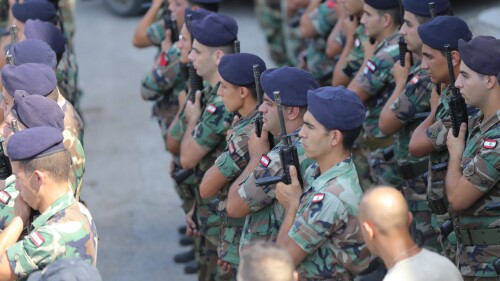Oberlin College’s faculty profile of Mohammad Jafar Mahallati, a professor of religion and Middle East and North African Studies, details his long career in academia and touts his development of “innovative courses with interdisciplinary approach to friendship and forgiveness studies.” Mentioned in passing, toward the end, is his tenure as Iran’s ambassador to the U.N. in the late 1980s.
What it doesn’t disclose is that Mahallati aided in covering up a mass murder of at least 5,000 political prisoners in 1988, according to a highly detailed Amnesty International report published in 2018 looking back at the legacy of the massacre.
While the U.N. General Assembly conveyed its “grave concern” about “a renewed wave of executions in the period July-September 1988” due to the “political convictions” of the prisoners, Mahallati denied the mass murder at the time, chalking up the source of the carnage to “fake information.”
Mahallati’s alleged misdeeds captured public attention anew in October 2020 when family members of the victims of the 1988 massacre, along with former Iranian political prisoners, sent a public letter to Oberlin President Carmen Twillie Ambar outlining the academic’s role as a regime official.
The letter urged Oberlin College’s management to “remove Mr. Mahallati from his position; and provide an apology from Oberlin College to the victims of the 1988 massacre and their families for hiring and promoting a person” involved in crimes against humanity.
Just last month, the U.N. disavowed its association with Mahallati. The U.N.'s Global Compact Agency said Mahallati used its logo for his Tehran-based organization Friendship for Sustainability Center without permission and want it removed from his website.
Similarly, Columbia University’s Middle East Institute scrubbed Mahallati from its website as a visiting fellow in February. It took a press query to activate Columbia’s damage control efforts. Columbia University spokeswoman Caroline Adelman wrote in a text message to Iranian-American human rights activist Lawdan Bazargan that “any reference to Prof. Mahallati you may have seen on a Columbia website was posted in error and has been deleted.”
Bazargan, whose brother Bijan was murdered by the regime during the 1988 prison bloodbath, launched the campaign against Mahallati with other Iranian dissidents to secure justice for the victims.
Mallahati also made attacks against the persecuted Baha’i community in Iran in the 1980s, declaring, “The problem was not religious but political; the Baha’i community conducted immoral activities under the cover of religion.”
The Baha’i are a religious minority who have faced extensive persecution since the 1979 revolution. While Mahallati denounced the Baha’i at Turtle Bay, Iran’s regime was executing Baha’is for merely practicing their faith.
Disturbingly, Oberlin College is ignoring the long and serious bill of particulars against Mahallati. Oberlin’s spokesman Scott Wargo said the allegations of crimes against humanity are “concerns about his [Mahallati’s] statements during a meeting with United Nations representatives more than 30 years ago.” The fact that Mahallati’s alleged crimes unfolded in 1988 should not mean they are time-barred for an inquiry and a possible stripping of Mahallati’s tenure.
To understand the disconnect between Mahallati’s efforts to forge a new identity for himself and his role in one of the worst domestic examples of Iranian regime terrorism, one need only watch the college’s promotional video of Mahallati on its website. In it, he claims to advocate an “ethics of friendship” and “friendship as a worldview.”
Mallahati is but one of many Islamic Republic officials who have settled in the West, particularly in U.S. academia, to enjoy the basic freedoms denied their own people. Another Iranian diplomat possibly involved in human rights abuses, ex-Iranian ambassador to Germany Seyed Hossein Mousavian, is a scholar at Princeton who some Iranian-Americans argue has “blood on his hands” in connection with Iranian regime-sponsored murders in Germany.
During Mousavian’s diplomatic tenure in Berlin, Iran’s regime assassinated four dissidents at West Berlin’s Mykonos restaurant in 1992. Mousavian denies knowledge of the operation, though his role as ambassador would have likely meant full knowledge of the regime’s activities in Germany.
While Mousavian oversaw the Berlin embassy, it served as a headquarters for a government intelligence gathering operation largely focused on the activities of the exiled Iranian opposition. The German government requested that he along with members of the intelligence section of the embassy be removed.
Mousavian’s work for the regime has not prompted a change in Princeton University employment of Mousavian, and Oberlin has dodged all inquiries about Mahallati’s alleged in covering up crimes against humanity in Iran.
Rather than open a formal investigation into Mahallati, Oberlin’s President Carmen Twillie Ambar has devoted her time to blocking questions about him from Iranian dissidents and journalists on Twitter. Ambar blocked the prominent human rights expert Hillel Neuer who “politely asked” about “her school’s Peace Scholar” with respect to the massacre of thousands of Iranian political prisoners.
The erstwhile core tenants of Oberlin College’s liberal values are embodied in its official motto of “Learning and Labor.” But its record in addressing Mahallati’s alleged crimes against humanity shows the management of the college has neither done the labor to investigate nor learned the lessons of historic crimes of the magnitude of the 1988 massacre.
U.S. academic institutions should not serve as a refuge for Iranian officials involved in human rights abuses. Oberlin must fully investigate and possibly discipline Mahallati. The Islamic Republic’s victims deserve justice, a cause Oberlin claims to champion.








